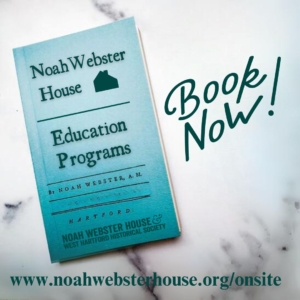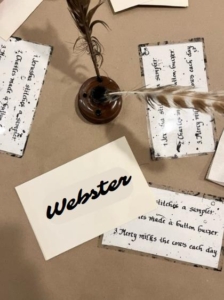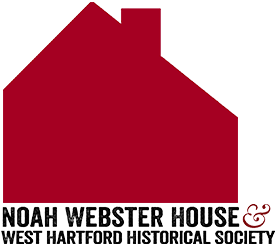On-Site Programs
Thank you for your consideration of Noah Webster House Educational programming! See below for full descriptions of our current educational program offerings. These programs are available for all public, private, and homeschool groups. For more information, please contact our Education Department by filling out the contact form below. We hope to see you soon!

*NEW* Connecticut Town Meeting
(Grade 8)
How did democracy play a role in the lives of early Americans before and during the American Revolution?
Theme: Connecticut Town Meeting will explore themes of American democracy, civics, and
government through a historical lens. Students will learn how perspectives are formed based on
historical context and how these decisions have a national and global effect. This program
highlights the roots of American democracy and the role that it plays in maintaining a free and
fair society.
In 1774, Hartford residents voted to cease all trade with England, in response to policies & taxes considered unfair by the local population. Students will visit the National Historic Landmark birthplace of Noah Webster, Jr., hear stories of townspeople in Webster’s time who struggled with a choice of supporting continued English rule or supporting independence, and be challenged to interpret the issues, defend their positions, and vote in the “Town Meeting.”
This program was made possible through the generosity of the Swindell family…in memory of Joan M. Swindell.
Life on the Webster Farm
(Grades 4-8)
“It was an amazing and enjoyable experience for all my students and parents. [They] were extremely impressed with all the hands-on activities and facts the students learned.” -Forestville Fifth Grade Teacher
How did early American families live, work, and play?
Theme: In 1774, children were responsible for learning and contributing to the wellbeing of their families and communities by doing chores related to housekeeping, farming, and production of textiles and food.
Guided by our museum educators (in period attire), students will explore Noah Webster’s historical birthplace and the times he lived in, while engaging in hands-on activities that demonstrate different aspects of early American life.
Everyone will help to prepare the mid-day meal (dinner) in the 18th-century reproduction kitchen, (over the open hearth), and experience how to prepare wool & flax, the raw materials that the Webster family would use to create yarn for clothing, blankets and other necessities. Students can assist with “carding” and spinning wool, breaking flax, and learn how weaving was accomplished.
Students will sew their own sampler, experience what school was like in Early America, learn a period dance called The Townsend Reel, and play games that were popular with children in the 1700s.
Cost: $25/student. Program length: 3½ hours (including ½ hour for lunch).
Community Life in the 1700s
(Grades 4-8)
“Overall, the experience was great. The docents had great energy and were very knowledgeable about the house and the history… They really enjoyed it all and were thankful to get to experience the Noah Webster House.” -West Hartford Fifth Grade Teacher
What are the stories of freedom and power that define community life in the 1700s in West Hartford?
Theme: Historians look at many sources when doing research and they interpret their information by making them into stories about the past.
This program teaches students how to conduct a “community study,” to examine the past with a focus on a single early American community. Students will uncover the stories of specific people who lived in West Hartford (Hartford’s “West Division” during the 1700s), along with their roles within the community and relationships with each other.
Students are encouraged to be curious, ask questions, and draw conclusions about early American life, as they move through various rooms in the Noah Webster House. This program engages with students as more than just casual observers- they take on the role of being young historians as they study artifacts and primary documents straight from the West Hartford History Center archive.
While cooking on our open hearth, carding wool with historical tools, and passing precious leisure time with 18th-century toys, students will learn where community resources came from, who had access to them, and how they were used.
This hands-on program explores the stories of local indigenous and enslaved people, offering a broader view of the multiple perspectives and voices that made up life in 1700s West Hartford. Students will unlock skills and awaken aspirations to study their own community’s local history.
Cost:$25/student. Program length: 3½ hours (including ½ hour for lunch).
The Early American Experience!
(All Ages)
Give your students the Early American Experience! At the Noah Webster House, students will participate in the daily chores, responsibilities, and fun of the 18th Century! Your class will split up into six groups and led through the House by our Museum Educators. Get ready to join in on the process of carding wool, preparing a traditional colonial applesauce recipe, writing with quill and ink, dancing, and more!
During the fun, your students will learn and discuss food preservation, the process of textile production, hygiene, one room schoolhouses, and how early Americans had fun.
Cost: $20/student. Program length: 2 hours.
Early American Life
(Grades K-4)
What role did children play in contributing to the wellbeing of their community and families?
Theme: Early American families were usually not self-sufficient. They depended on a variety of local and global services and product trade networks for comfortable survival.
On a 18th-century farm in New England, even young children contributed to the welfare of the family. Students will card & spin wool, process flax for linen, and weave on a tape loom as they explore the way textiles were made for clothing, blankets & other necessities.
In the kitchen, students will learn how the fireplace worked, handle cast iron cooking implements, and discuss growing & preserving foods in the era long before refrigeration & processed foods in modern times.
While early-American children worked hard to help accomplish necessary household and farming responsibilities, they also found time for fun! Students will take turns playing with 18th-century toys.
Cost: $18/student. Program length: 1 ½ hours.
Coming Spring 2025! – Webster’s Wanderings: The Geography of Early America
(Grade 4)
History Explorers
Funds are available for a limited time to provide this history exploration to Connecticut Title 1 Schools. Contact the Education Department for more details and funding possibilities at (860) 521-5362 x210 or education@noahwebsterhouse.org.


